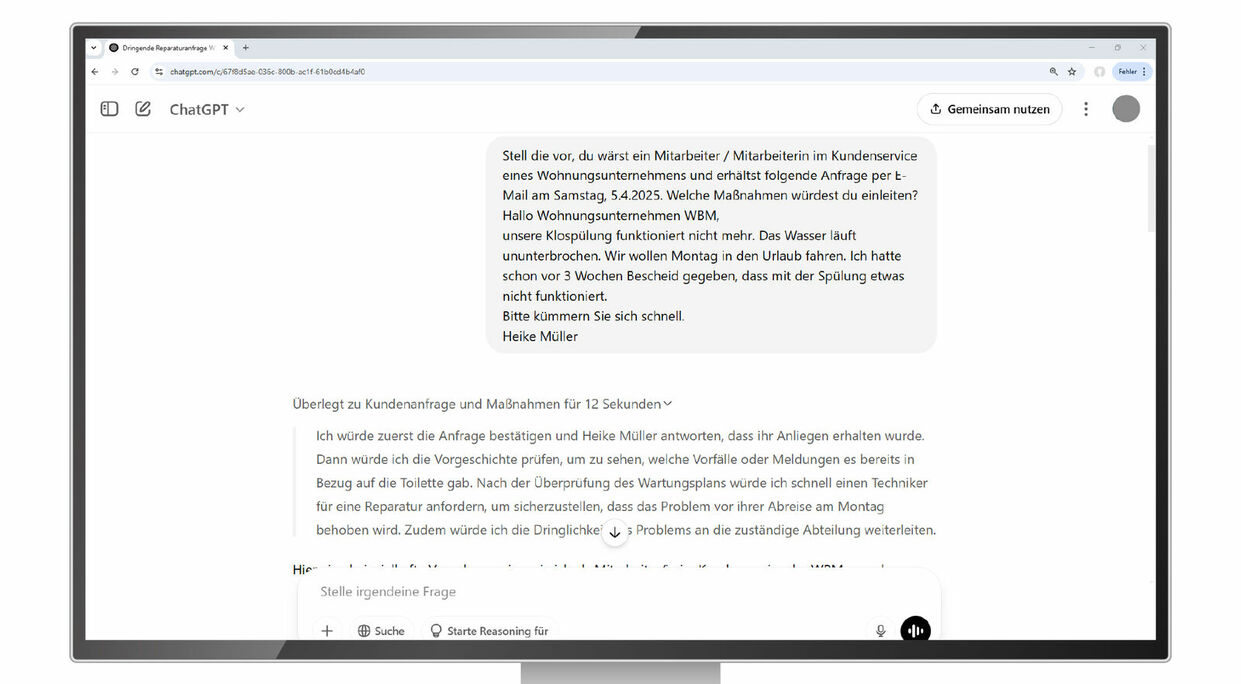Reasoning – When AI starts to “think”
What makes reasoning so unique?
Unlike conventional language models that simply predict the next likely word, reasoning takes things a step further: it forces the AI to go through an internal process of logical thinking. You can imagine it like a person thinking out loud before responding. The machine maps out an internal path – a chain of reasoning – before arriving at a conclusion.
Tobias Koops, Senior Software Developer and AI Expert, explains the benefits of this next stage in AI evolution: "This internal thought process leads to improved answers – and ones we humans can actually follow. In a way, the model explains how it arrives at its response. That means greater transparency and often better outcomes. The AI has to 'work' to find the right solution instead of relying purely on probability like before.”
Key technological milestones in reasoning
The first major breakthrough came from Google in 2022 with the concept of Chain of Thought Prompting. It showed that language models perform significantly better when prompted to explain their reasoning step by step – much like children showing the steps of their work in a math exercise.
In 2023, DeepSeek-V2 raised the bar by integrating logical reasoning efficiently into AI models. More recent advances such as GPT-4, Gemini 1.5, and Claude 3 build on these foundations to further improve accuracy and transparency.
Koops adds: "Our solution also builds on a model that will soon incorporate reasoning – opening up entirely new possibilities for us.”
Why people are willing to wait – or pay more
This new quality of AI is already making an impact: people are willing to wait longer or invest more for answers that are not just accurate but also traceable and reasoned. In fields where accuracy, reliability, and transparency matter, reasoning becomes the new currency. Especially in areas where AI supports critical decisions – contract analysis, risk assessment, technical evaluations – speed needs to take a back seat to quality. "In tenant communication, we already see that some inquiries require more follow-up than others. Roughly 75% of tenant inquiries are standard – name changes, pet approvals, or rent clearance certificates. But once things get more complex, the risk of errors increases significantly. Reasoning could be a real game changer here,” explains Koops.
But is it risk-free? Not quite.
As promising as reasoning is, it also comes with challenges. In addition to general concerns – such as data privacy, ethics, or the risk of misinformation – one of its biggest strengths also poses a risk. Koops explains: "The idea behind exposing the AI's thought process is to increase transparency – especially to help identify errors. But a test by AI company Anthropic showed that these reasoning chains aren’t always trustworthy. Some models didn’t truthfully explain how they arrived at their conclusions. So it's still up to us to critically evaluate AI-generated responses.”

With reasoning, the AI documents its train of thought – a step-by-step process visible to the user. In one example, the AI considers the reporting history, maintenance schedules, and time sensitivity of a defect report submitted by a tenant.
How reasoning can be applied in real estate
While reasoning is a cross-industry technology, use cases from the real estate sector clearly show its practical value. Koops offers insights into current thinking: "Imagine a digital mailroom that doesn’t just sort tenant requests but also evaluates the content logically: Is this an urgent issue? Are there similar cases already on file? Does this require immediate action? Reasoning is far better suited to these tasks than conventional AI systems.”
In such scenarios, reasoning becomes the foundation for real assistant systems. AI models can learn to identify relevant information, understand relationships, and recommend next steps – like a seasoned employee. Ideally, the thinking behind it remains understandable, helping people stay in control while machines handle the complexity.
Conclusion
Reasoning represents a major leap forward in AI development. It delivers responses that are not only accurate, but appear truly “thought through.” This technology opens new doors for decision-making and automating complex processes. Whether in real estate or other industries: those who invest in the future of logical AI are laying the foundation for more efficient, transparent – and future-proof – systems.
You might also be interested in:
- All solutions around AI and our roadmap for the future at OPAF in June!
- PROMOS News "Groundbreaking Innovation – PROMOS and ProPotsdam launch the real estate industry’s first AI-powered inbound mail processing!"
- PROMOS News "From bytes to bricks: how AI is turning the property world on its head – a conversation with Nida Kizilaslan, Head of Software Development"
- Article "Artificial intelligence in the real estate industry – a vision of the future"

